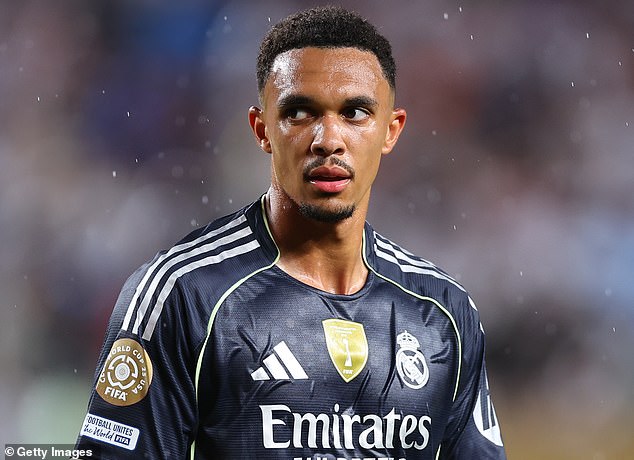A high-profile transfer often signifies a fresh start, a clean slate. For Trent Alexander-Arnold, his move to the illustrious Santiago Bernabéu and the white of Real Madrid was anticipated as precisely that. Yet, barely three months into his Spanish sojourn, the perennial questions surrounding arguably football`s most unique right-back have resurfaced with a familiar, almost ironic, tenacity. Is his future truly in defense? And how does a player of such singular talent fit into the rigorous tactical frameworks of elite club and international football?
The English national team`s recent World Cup qualifiers offered the latest chapter in this ongoing saga. The decision by Gareth Southgate (not Thomas Tuchel, as some reports erroneously suggested) to omit Alexander-Arnold from the squad for fixtures against Andorra and Serbia was framed by the manager as an opportunity for the player to “settle and find his rhythm” in his new environment. A considerate gesture, perhaps, acknowledging the immense personal and professional upheaval of a first career transfer. Yet, beneath the diplomatic phrasing, a more profound tactical calculus continues to unfold.
The Irresistible Force: Alexander-Arnold`s Offensive Prowess
There is little debate over Alexander-Arnold`s offensive contributions. He is, to put it mildly, a statistical outlier. Over his Premier League career, few players could rival his output in terms of expected assists or successful passes into the attacking third. He operates not merely as a right-back, but as a deep-lying playmaker, a quarterback from the flank, capable of dissecting defenses with pinpoint crosses, incisive through balls, and a vision that few midfielders possess. Managers like Jürgen Klopp (and later, Arne Slot) built entire ball progression and chance creation strategies around his unique ability to move centrally and dictate play, knowing his attacking bounty far outweighed any tactical concessions.
“His ability to pick out a pass from the right flank is almost peerless, transforming the traditional right-back role into something akin to a deep-lying architect.”
The Immovable Object: Defensive Scrutiny in High Stakes
However, the narrative invariably shifts when the stakes intensify. In knockout football, where a single defensive lapse can indeed send a team “packing their suitcases and home,” Alexander-Arnold`s defensive vulnerabilities become a more prominent discussion point. It’s a delicate balancing act: how much offensive upside is one willing to trade for defensive solidity? National team managers, often prioritizing a robust defensive foundation in tournament settings, frequently face this dilemma. The memory of the 2022 Champions League final, where a crucial defensive misstep contributed to Liverpool`s defeat, lingers as a potent reminder of this tactical tightrope.
This debate is further complicated by the sheer depth of talent available to England. Kyle Walker offers searing pace and defensive discipline. Reece James, when fit, is a formidable two-way threat. Even the return of Ben White to the conversation, prior to injury, highlighted the abundance of options at right-back, each offering a distinct profile that forces a different tactical compromise.
The Madrid Crucible: A New Stage, Familiar Questions
At Real Madrid, Alexander-Arnold finds himself in a similar, albeit grander, crucible. He`s vying for a starting berth with club captain Dani Carvajal, a veteran whose defensive acumen and big-game experience are beyond question. While manager Xabi Alonso has commendably emphasized the strength in having two such distinct talents and the opportunity to tailor selections to specific opposition, the early murmurs from the Spanish press suggest that adaptation isn`t always seamless. Labels like “timid” or “conservative” have, perhaps unfairly, been applied to his initial outings, and the inevitable question of a permanent move to central midfield has resurfaced – a dance as old as his career, despite its mixed success at Euro 2024.
Alexander-Arnold`s ambition, famously articulated as a desire to win the Ballon d`Or and “test myself in a new context,” suggests he understands the challenge. His impressive performance against Mallorca, only denied an assist by a VAR offside call against Kylian Mbappe, hints at the immense potential yet to be fully unleashed. Yet, becoming an undisputed starter for both club and country will require more than flashes of brilliance; it demands consistent tactical reliability across all facets of the game.
The Path Forward: Refining the Hybrid Role
So, what can the 25-year-old do to cement his place and quiet the skeptics? A tangible step forward defensively, without compromising his offensive genius, would undoubtedly be key. The previous season under Arne Slot at Liverpool showed glimpses of a more conservative, yet still effective, Alexander-Arnold. This evolution, combining his unparalleled creative output with enhanced defensive diligence, could unlock a new, hybrid role that managers find irresistible. With potentially 60 games in a season, plus international commitments, the opportunity to adapt, learn, and grow is immense.
The journey of Trent Alexander-Arnold remains one of football`s most compelling narratives. A player of generational attacking talent, continually grappling with the defensive demands of the modern game, under the brightest spotlights at Real Madrid and with England. His quest for tactical equilibrium, to be both the irresistible force and an unbreachable wall, is not merely a personal ambition but a fascinating experiment in contemporary football strategy.

